Turning clay into a “sticky paddy field” for growing oranges
Speaking about the process of starting an organic orange business, Mr. Thuy said he has been growing oranges since his children started primary school and now they have families of their own. That means Mr. Thuy has been growing oranges for 20 years. He said that when he first came here, he leased a field full of straw grass, reed grass and curled grass to plant oranges, many locals told him directly: Easy like rice, transplanting this land is still difficult to eat, now switch to Fruit-trees. , make sure you are safe!
But in the eyes of a sensitive farmer, Thuy knows that this barefoot is very nutritious, if you work hard to improve the fields for citrus trees, the quality of the fruit will be very good, and it is also difficult to rent in this area The field is close to the house, convenient for traffic, security and good order.
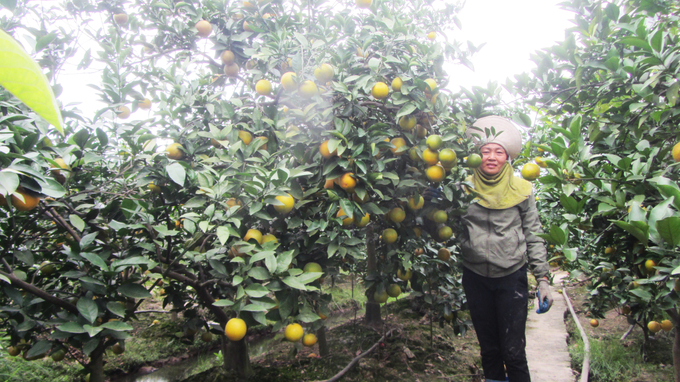
From the hard, discolored clay, Thuy and her husband have turned into very favorable land for growing oranges. Photo: HaiTien.
Thought it would be easy but didn’t expect it would take Mr. Thuy almost 6 months to lease more than 4 acres of fields because he had to mobilize house to house with abandoned fields to lease the right to use again equal to the yield of transplanted rice 1 v/year, Mr. Thuy has full authority to cultivate these fields with the crops permitted by law.
After leasing the field, Mr. Thuy still needs 4 months to restore the edge of the site, the excess embankment, clean up the grass, clean up rubbish and grow oranges. The hardest part is removing weeds as the field has a very heavy mechanical component, basically just a type of clay with a mottled rust-yellow border, so digging up and burning all the grass roots is very laborious.
When asked why not use herbicides recreationally? Mr. Thuy explained that pumping chemicals into the soil would kill all valuable soil resources such as microorganisms and irreplaceable microorganisms, making the soil harder, more difficult to cultivate and reducing the quality of agricultural products from land plants.
At first, Mr. Thuy only produced oranges in the direction of VietGAP, including balanced fertilization of nitrogen, phosphorus, potassium and rotten organic fertilizers and pest control with pesticides approved by the state for use on safe vegetables and fruit… After that, he gained a lot of experience and evolved into standard VietGAP farming, e.g. B. Prioritizing the use of pesticides of microbial origin, herbs, replacing straight fertilizers (nitrogen, phosphorus, potassium) with synthetic and phosphorus-NPK microorganisms, combined with more soybean seeds and kitchen ash .
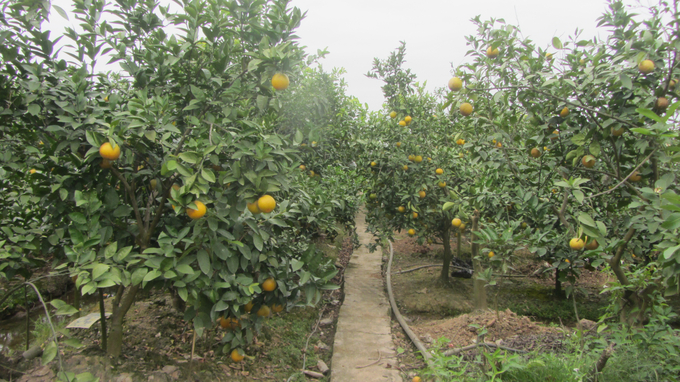
Thanks to organic farming and the philosophy of “taking as much as giving back to the land”, the Thuy orange orchard has a very high fruit yield every year. Photo: HaiTien.
Mr. Thuy has completely switched to organic cultivation from 2021 to now, does not care for the orange garden with substances of chemical origin, does not use growth promoters, does not use fruit preservatives and fertilizes: kitchen ash instead of potassium, raw soybean meal instead of NPK. The focus is on the use of microbial organic fertilizers.
what is his money
Mr. Thuy revealed that he only owns over 1.8 ha of Vinh oranges but needs to invest VND 500-600 million every year to buy soybeans, kitchen ash, microbial fertilizers and biological pesticides. Thanks to this, the harvest did not disappoint the farmer, since the first sowing (2002) hitherto only 2006 was hit by hail, the entire region of the Red River Delta lost citrus and Mr. Thuy’s orange orchards, which is also inevitable , for the rest of the year may Mr. Thuy collect 25-30 tons of fruit, the selling price is also higher than last year. With this 2022 orange harvest, Mr. Thuy has received 40 tons of fruit, the selling price is 70,000 VND/kg, an increase of 10 tons in production and 10,000 VND/kg in value compared to the same period in 2021.
The reason why Mr. Thuy’s oranges are always so expensive is because they are very sweet and fragrant, partly because of sustainable organic farming, partly because the garden soil contains many rare and valuable micro-elements that help the oranges taste sweet. On the other hand, the fact that Mr. Thuy spared no money to buy microbial organic fertilizer for plants and soil has promoted the release of trace elements and nutrients in acacia soil for orange trees, creating excellent fruit quality.
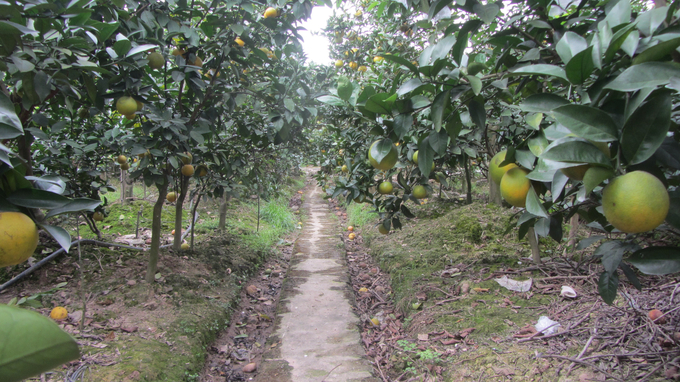
Mr Thuy’s 20 year old orange orchard is still healthy and the soil is healthy and bearing fruit, while the orchards that were only used for 8-10 years will perish. Photo: HaiTien.
According to Mr. Thuy, the most dangerous object on orange trees is greening disease. However, the greening of oranges, as well as incurable diseases in humans, knowing how to prevent, detect early and treat promptly will certainly reduce the damage. Therefore, before planting oranges, Mr. Thuy must select disease-free seedlings, take care of them in time to achieve healthy growth and increase resilience. timely and thorough prevention and control of cicadas (mediators of greening disease); regularly visit the garden when the plants are sick, prune immediately, shovel the soil 1.5m deep, the whole plot has yellow roots and green veins, move far away from the orange garden, incorporate lime into the hole, add new soil and plant disease-free plants …
Even with other pests such as anthracnose, fruit flies, Mr. Thuy has always prevented it from afar by pruning to create an always open canopy for the garden; Spray the anthracnose room when the weather is cloudy, rainy or high humidity, spray it when there is no early disease. In particular, yellowflies that damage fruit need to be sprayed with specific biological medicines once a month, twice a month from fruit weight gain to harvest, combined with additional yellowfly traps.
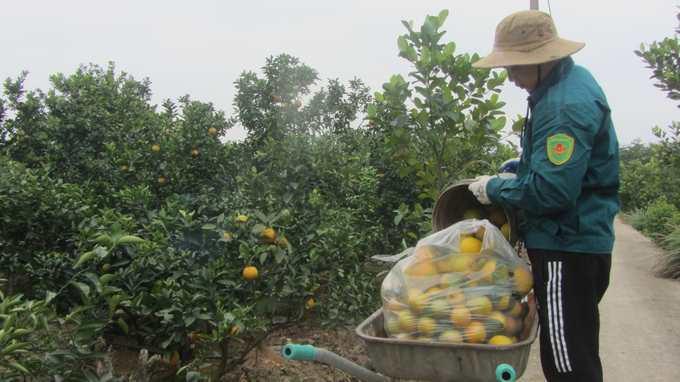
With this 2022 orange harvest, Mr. Thuy received 40 tons of fruit at a selling price of VND 70,000/kg. Photo: HaiTien.
Annual fertilization, Mr. Thuy also takes the direction of depriving the tree and soil, as long as the fruit / fruit and fertility must compensate for the soil and the tree’s nutrients and fertility. If you do the opposite, the tree will bear very little fruit or fruit each year. “It’s like in the interpersonal relationships in general, it is necessary to satisfy each other, otherwise just once it will be difficult to ask for help next time,” said Thuy of .
Love trees and work hard, although he planted nearly 2 acres of oranges, he and his wife did all the gardening themselves and didn’t hire outside workers. Thuy calculates that the irrigation has an automatic drip tube to each tree, uses an electric pump or battery to spray weeds, because the garden soil is always hard, the grass can’t grow, and the field can’t be watered in time, still cracked, so all year round we don’t have to cut/weed all kinds of weeds.
The only things he and his wife can do themselves are fertilizing, harvesting and pruning. In addition, I go to the garden every day to check the “health of the soil” and pests, and incidentally grab scissors to promptly cut off ineffective branches, stunted fruits, and no longer waste time.
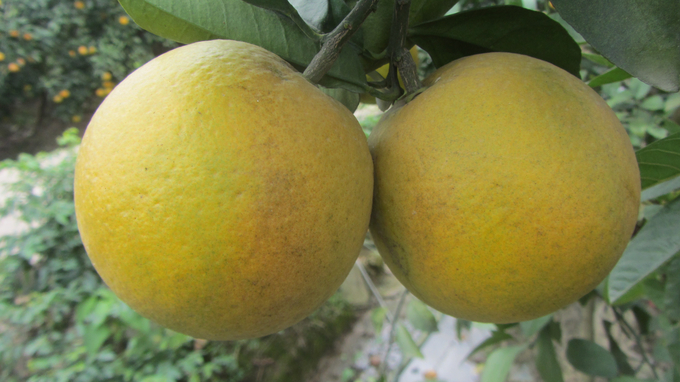
The high-quality, sweet and delicious oranges from Mr. Thuy’s garden are always bought by customers willing to spend their “wallets” at high prices. Photo: HaiTien.
Mr. Thuy’s orange orchard has been using the fruit for 20 years, but the tree and the soil are still very healthy, giving a stable fruit yield and are not infected with “terminal” diseases, while other orange orchards have only been fruiting for 8-10 years through Greening damaged or old and had to be felled.
Currently, Mr. Thuy has just leased another 0.7 ha of field, bringing the total area of oranges grown in organic direction to over 2.5 ha. The plan by the end of 2023, Mr. Thuy will collect over 50 tons of fruit. All Mr. Thuy oranges placed on the market come with labels and barcodes, very handy for traceability when needed.

